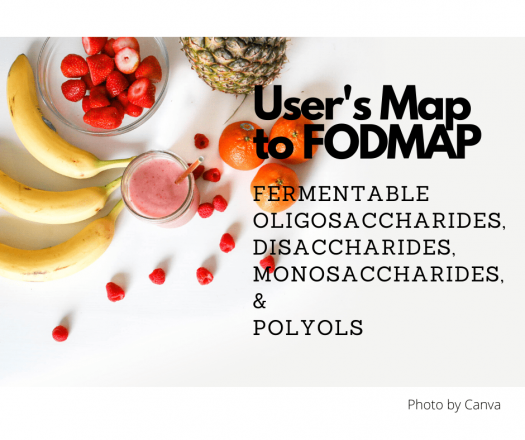By: Annabelle Shaffer, BS, Master’s candidate in the Division of Nutritional Sciences at University of Illinois Urbana-Champaign.
What is IBS?
Irritable Bowel Syndrome (IBS) affects 11.2% of the world’s population. Females and people under 50 years of age are most commonly affected. 1,2 IBS is a functional gastrointestinal disorder. Unlike celiac disease or ulcerative colitis, there is no visible damage to the intestines.
IBS symptoms center around abdominal pain and include at least one of the following: 1) irregular bowel movements, 2) change in bowel movement frequency, 3) change in consistency or solidity of stool.1
What is the FODMAP diet?
Researchers at Monash University developed the FODMAP diet to reduce the symptoms of IBS. The FODMAP diet reduces the intake of Fermentable Oligosaccharides, Disaccharides, Monosaccharides, and Polyols. These fermentable carbohydrates are thought to contribute to IBS symptoms but not the cause of IBS.1 It is essential to note that FODMAP is not a weight-loss or fad diet but a therapeutic diet.
Fermentable Carbohydrate Type
- Oligosaccharides3 are found in asparagus, broccoli, beets, garlic, onion, wheat, rye, chickpeas, soy products, and lentils. Try FODMAP-friendly substitutions like eggplants, carrots, spinach, chives, potatoes, quinoa, rice, and gluten-free breads and pastas.
- Disaccharides3, such as lactose, are found in cow’s milk, yogurt, ice cream, and soft cheeses. For replacements, try low-lactose and lactose-free products including lactose-free milk and yogurts, plant-based milks and yogurts, and hard cheeses.
- Monosaccharides3 are found in stone fruits, apples, honey, agave, and high-fructose corn syrup. Try other fruits like, bananas, blueberries, lemons, strawberries, and melon.
- Polyols3 are in stone fruits, cauliflower, mushrooms, and sugar-free products. Instead, use parsnips, cucumbers, ginger root, and olives.
Reducing foods containing these carbohydrates has shown improvement in symptoms and quality of life of IBS patients.1,4,5 It is not necessary to stop eating all FODMAP containing foods.6 Instead, remove these foods for 2-6 weeks and gradually reintroduce them one at a time into the diet. During the reintroduction phase, monitor your symptoms with each new food for 3 days. If a food is not causing symptoms, then it’s a keeper!
FODMAP removes some of my favorite foods! How do I build a tasty FODMAP-friendly menu?
The change from a regular diet to a FODMAP diet can be quite an adjustment! Read below for tips on building a delicious meal.
Flavorings:
Garlic and onion are big flavor boosters. Herbs, such as basil, cilantro, and parsley, can add flavor in many dishes. Try them in a stir-fry or diced finely and added to eggs or burgers. Spices (except garlic/onion powder/salt) and vinegars are also great alternatives.
Proteins:
Red meat, poultry, fish, and eggs do not contain FODMAPs. Protein can also be found in lactose-free dairy products, hard cheeses, and beans and nuts in small servings.
Grains:
Wheat and rye contain oligosaccharides. Gluten-free products eliminate all wheat and rye as they contain gluten protein, making gluten-free products a good option for IBS patients. IBS patients can consume oats, rice, quinoa, buckwheat, and corn products.
Desserts:
Ice cream and high-fructose corn syrup are common in desserts. For a tasty treat, look for coconut milk-based ice cream or try strawberries with non-dairy whip cream or a gluten-free baking mix. When choosing gluten-free products, double-check the label to ensure the remaining ingredients are low FODMAP.
Need Additional Resources?
Monash University FODMAP Diet App
Kate Scarlata, RDN & IBS Expert
References
- Paduano, D., Cingolani, A., Tanda, E., & Usai, P. (2019). Effect of Three Diets (Low-FODMAP, Gluten-free, and Balanced) on Irritable Bowel Syndrome Symptoms and Health-Related Quality of Life. Nutrients, 11(7), 1566. https://doi.org/10.3390/nu11071566
- Irritable Bowel Syndrome (IBS) | NIDDK. National Institute of Diabetes and Digestive and Kidney Diseases. Retrieved 17 March 2020, from niddk.nih.gov/health-information/digestive-diseases/irritable-bowel-syndrome.
- Try a FODMAPs diet to manage irritable bowel syndrome. Harvard Health Publishing. (2019). Retrieved 17 March 2020, from www.health.harvard.edu/diet-and-weight-loss/a-new-diet-to-manage-irritable-bowel-syndrome.
- Halmos, E., Power, V., Shepherd, S., Gibson, P., & Muir, J. (2014). A Diet Low in FODMAPs Reduces Symptoms of Irritable Bowel Syndrome. Gastroenterology, 146(1), 67-75.e5. doi.org/10.1053/j.gastro.2013.09.046
- Pedersen, N., Ankersen, D., Felding, M., Wachmann, H., Végh, Z., & Molzen, L. et al. (2017). Low-FODMAP diet reduces irritable bowel symptoms in patients with inflammatory bowel disease. World Journal Of Gastroenterology, 23(18), 3356. doi.org/10.3748/wjg.v23.i18.3356
- Starting the Low FODMAP Diet – Monash Fodmap. Monashfodmap.com. (2020). Retrieved 17 March 2020, from www.monashfodmap.com/ibs-central/i-have-ibs/starting-the-low-fodmap-diet
Photo made with Canva.













